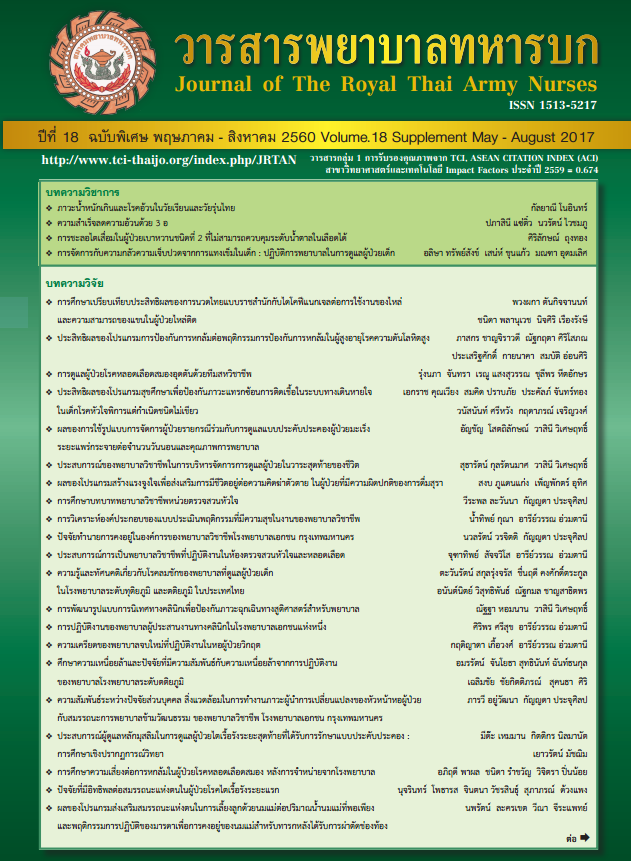ประสบการณ์ผู้ดูแลหลักมุสลิมในการดูแลผู้ป่วยไตเรื้อรังระยะสุดท้ายที่ได้รับการรักษาแบบประคับประคองการศึกษาเชิงปรากฏการณ์วิทยา
Keywords:
ประสบการณ์ผู้ดูแลหลักมุสลิม, ผู้ป่วยไตเรื้อรังระยะสุดท้าย, การรักษาแบบประคับประคอง, Muslim Caregivers’ Experiences, End-Stage Renal Disease, Palliative CareAbstract
การวิจัยเชิงคุณภาพแบบปรากฏการณ์วิทยาเฮอร์มินิวติกนี้มีวัตถุประสงค์เพื่ออธิบายประสบการณ์ของผู้ดูแลหลักมุสลิมในการดูแลผู้ป่วยไตเรื้อรังระยะสุดท้ายที่ได้รับการรักษาแบบประคับประคอง กลุ่มตัวอย่างเป็นเป็นผู้ดูแลหลักมุสลิมที่รับรู้ว่าผู้ป่วยอยู่ในระยะสุดท้ายที่ได้รับการรักษาแบบประคับประคองและให้การดูแลผู้ป่วยอย่างน้อย 1 เดือน จำนวน 9 ราย เก็บรวบรวมข้อมูลโดยวิธีการสัมภาษณ์แบบเจาะลึกรายบุคคลและสังเกตแบบไม่มีส่วนร่วม วิเคราะห์ข้อมูลโดยใช้หลักการของแวน มาเนนผลการวิจัยพบว่าผู้ดูแลหลักมุสลิมสะท้อนความหมายของการดูแลผู้ป่วยไตเรื้อรังระยะสุดท้ายที่ได้รับการรักษาแบบประคับประคอง ในหมวดของโลก 4 ใบ (four life-worlds) คือโลกของตนเอง (corporeality or lived body) ประกอบด้วย5 กลุ่มความหมาย คือ 1) เหนื่อยล้า 2) ภูมิใจที่ได้ดูแล 3) ทำตัวให้เข้มแข็งและพร้อมให้การช่วยเหลือ 4) ทำดีที่สุดแล้ว และ5) ศรัทธาองค์อัลเลาะห์ โลกของความสัมพันธ์ (relationalityor lived relation) ประกอบด้วย 4 กลุ่มความหมาย คือ 1) ดูแลบนพื้นฐานของความรักความผูกพัน 2) การตอบแทนบุญคุณ 3) ด้วยรักและผูกพัน และ 4) สะพานเชื่อมระหว่างพระเจ้ากับผู้ป่วยโลกของสถานที่ (spatiality or lived space) ประกอบด้วย 3 กลุ่มความหมาย คือ 1) บ้านมีความหมายและความสำคัญ 2) พระเจ้าอยู่ในใจทุกที่ และ 3) พระเจ้ากำหนดสถานที่ตาย และโลกของเวลา (temporality or lived time) ประกอบด้วย 2 กลุ่มความหมาย คือ 1) เวลามีค่าและมีความหมาย และ 2) เวลาของชีวิตลิขิตโดยองค์อัลเลาะห์ข้อเสนอแนะจากผลการวิจัยครั้งนี้คือพยาบาลควรให้การพยาบาลด้วยความเข้าใจในหลักปฏิบัติและหลักศรัทธาของศาสนาอิสลาม เพื่อให้สอดคล้องกับวัฒนธรรมและความเชื่อของผู้ป่วยและผู้ดูแล
The experiences of Muslim Primary Caregivers Caring for Patients with End-Stage Renal DiseaseReceiving Palliative Care : A Phenomenological study
This hermaneutic phenomenological qualitative research aimed to describe Muslim caregivers experience in caring for patients with end-stage renal disease receiving palliative care. Informants were nine primary caregivers who were aware of the terminal diagnosis and provided care for patients for at least one month. Data were collected using individual in-depth interviews and non-participant observation. The interview transcriptions were analyzed using the four life-worlds of van Manen’s approach. The findings of the study were reflected within four life-worlds. Lived body included the thematic categories of 1) being tired, 2) feeling proud to care, 3) making oneself strong and ready to care, 4) doing one’s best, and 5) having firm faith in Allah. Lived relations consisted of 1) taking care on the basis of love and bond, 2) repaying gratitude, 3) those surrounding the patients are important, and 4) being a bridge between God and the patient. Lived space included 1) the home is a meaningful and important place, 2) God is always in mind everywhere, and 3) God determined a place of death. Lived time comprised 1) time is precious and meaningful, and 2) life time is determined by Allah. The results of the study can be used as basic information for health care providers to develop a culturally sensitive practice guideline for caregivers to care for patients with end-stage renal disease receiving palliative care.
Downloads
Downloads
How to Cite
Issue
Section
License
บทความหรือข้อคิดเห็นใดใดที่ปรากฏในวารสารพยาบาลทหารบกเป็นวรรณกรรมของผู้เขียน ซึ่งบรรณาธิการหรือสมาคมพยาบาลทหารบก ไม่จำเป็นต้องเห็นด้วย
บทความที่ได้รับการตีพิมพ์เป็นลิขสิทธิ์ของวารสารพยาบาลทหารบก
The ideas and opinions expressed in the Journal of The Royal Thai Army Nurses are those of the authors and not necessarily those
of the editor or Royal Thai Army Nurses Association.






